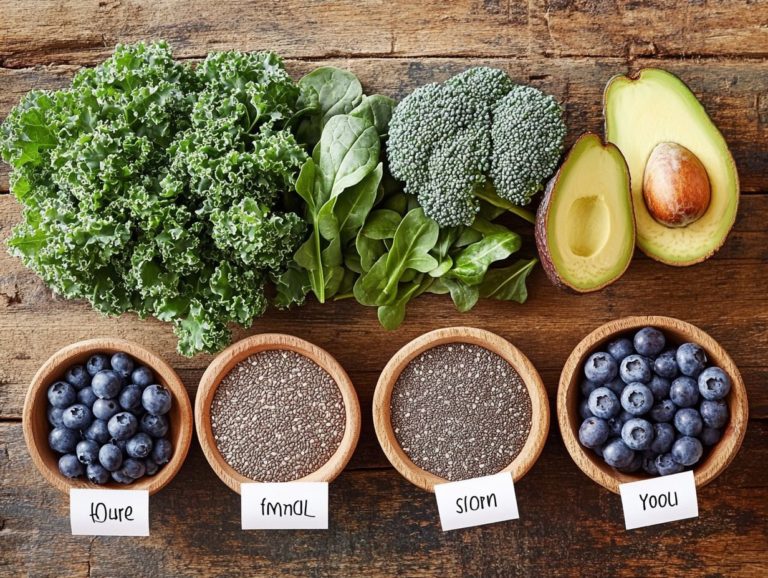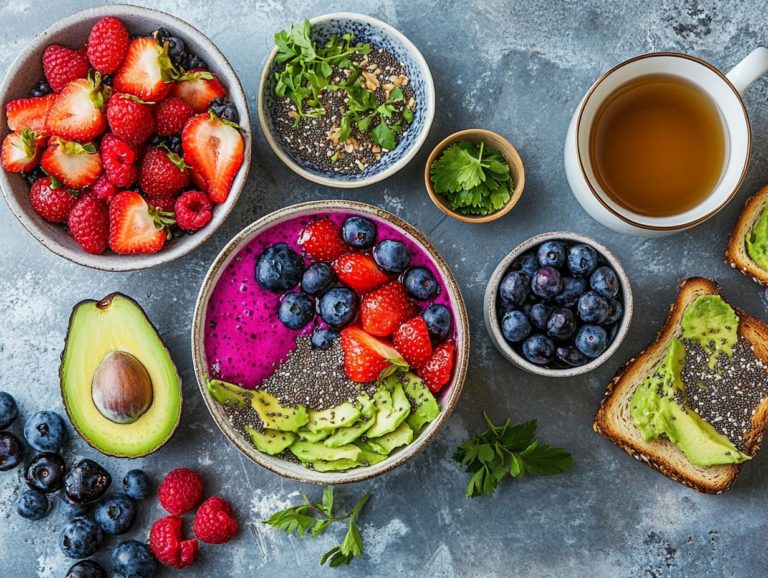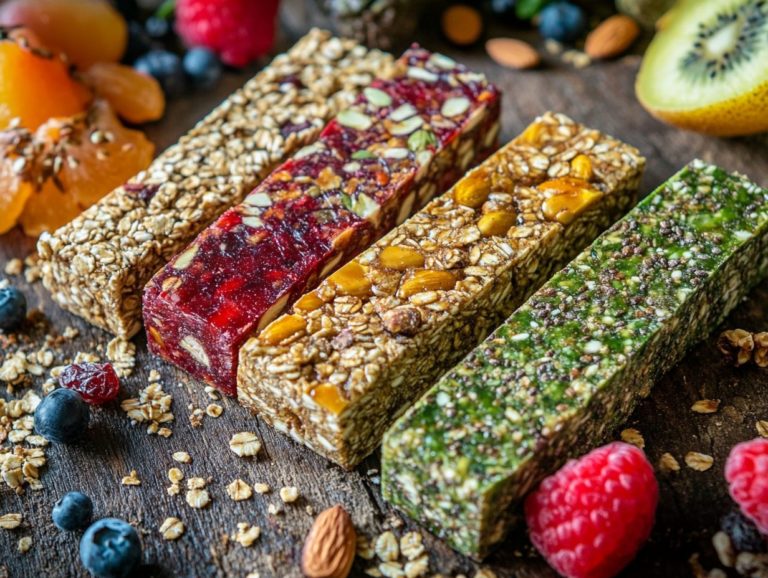Benefits of Matcha: What Makes It a Superfood?
Matcha, that vibrant green powder crafted from finely ground green tea leaves, has become a sensation in the wellness realm. Its rich history stretches back centuries in Japan, where it was celebrated not only for its exquisite flavor but also for its numerous health benefits.
Loaded with nutrients and antioxidants, matcha often earns the title of a superfood. Let s explore the fascinating world of matcha together, from its origins to its impressive nutritional profile and the myriad health benefits it offers.
You ll find valuable tips on seamlessly incorporating matcha into your diet, along with potential risks to keep in mind. Unlock the secrets of this ancient elixir and supercharge your daily routine today!
Contents
Key Takeaways:
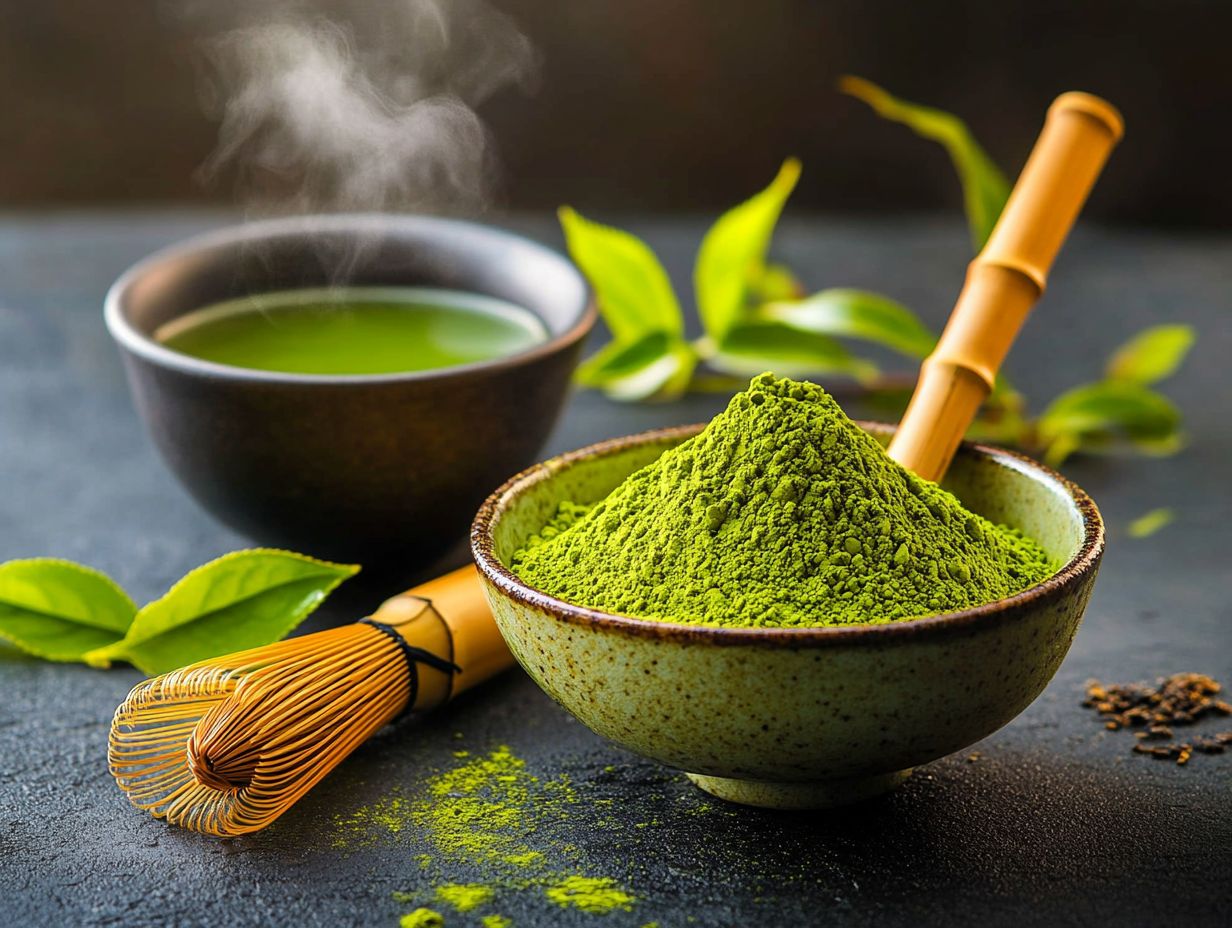
- Experience the magic of matcha, a powerful green tea bursting with nutrients and antioxidants.
- Enjoy several health benefits, including increased energy and metabolism, improved brain function and mood, and better heart health and immunity.
- Incorporating matcha into your diet can be easy and delicious with various recipes and ideas available, but be aware of potential risks and precautions, such as side effects and interactions.
What is Matcha?
Matcha is a finely ground powder from specially cultivated and processed green tea leaves, hailing from the Camellia sinensis plant. Its origins are steeped in Japanese culture, especially evident in traditional tea ceremonies where its vibrant green hue and distinct flavor are revered.
This exceptional variety of green tea has skyrocketed in popularity across the globe, celebrated for its numerous health benefits and its versatility in culinary creations, from matcha lattes to smoothies and delectable desserts.
Definition and Origins
Matcha, the exquisite powdered green tea you might enjoy today, has its origins in Japan but traces its roots back to China, where tea leaves were first brewed during the Tang dynasty.
During this vibrant era, the art of tea drinking flourished, eventually reaching Japan in the 9th century through Buddhist monks who recognized its invigorating properties. Over time, Japan refined this practice, transforming the rough powdered tea into the finely milled matcha we appreciate today.
This powdered form became a cornerstone of Japanese culture, especially within the tea ceremony, or ‘chanoyu.’ This ceremony embodies principles of harmony, respect, purity, and tranquility.
In this way, matcha transcended its origins as a simple beverage and evolved into a symbol of cultural significance and spiritual mindfulness.
The Nutritional Profile of Matcha
The nutritional profile of matcha is remarkably rich, presenting a potent blend of vitamins, minerals, and antioxidants. It s no wonder health enthusiasts are drawn to it for a natural boost in their diet.
Key Nutrients and Antioxidants
Matcha is brimming with essential nutrients and antioxidants, especially a unique group known as catechins, which are a type of antioxidant found in tea. These powerhouses offer a plethora of health benefits, including a boost in metabolism and even cancer prevention, thanks to the remarkable EGCG.
In addition to these potent catechins, matcha is packed with vital vitamins and minerals like vitamin C, selenium, chromium, zinc, and magnesium. Together, they work wonders for your immune system, fortifying your defenses against illnesses.
Matcha s metabolism-boosting properties make it an excellent ally for weight management and enhancing your energy levels, which is why it’s a favorite among those seeking to elevate their physical vitality.
Moreover, matcha s antioxidants play a crucial role in skin health. They help reduce inflammation and combat free radicals, resulting in a more radiant complexion and a youthful appearance.
Health Benefits of Matcha
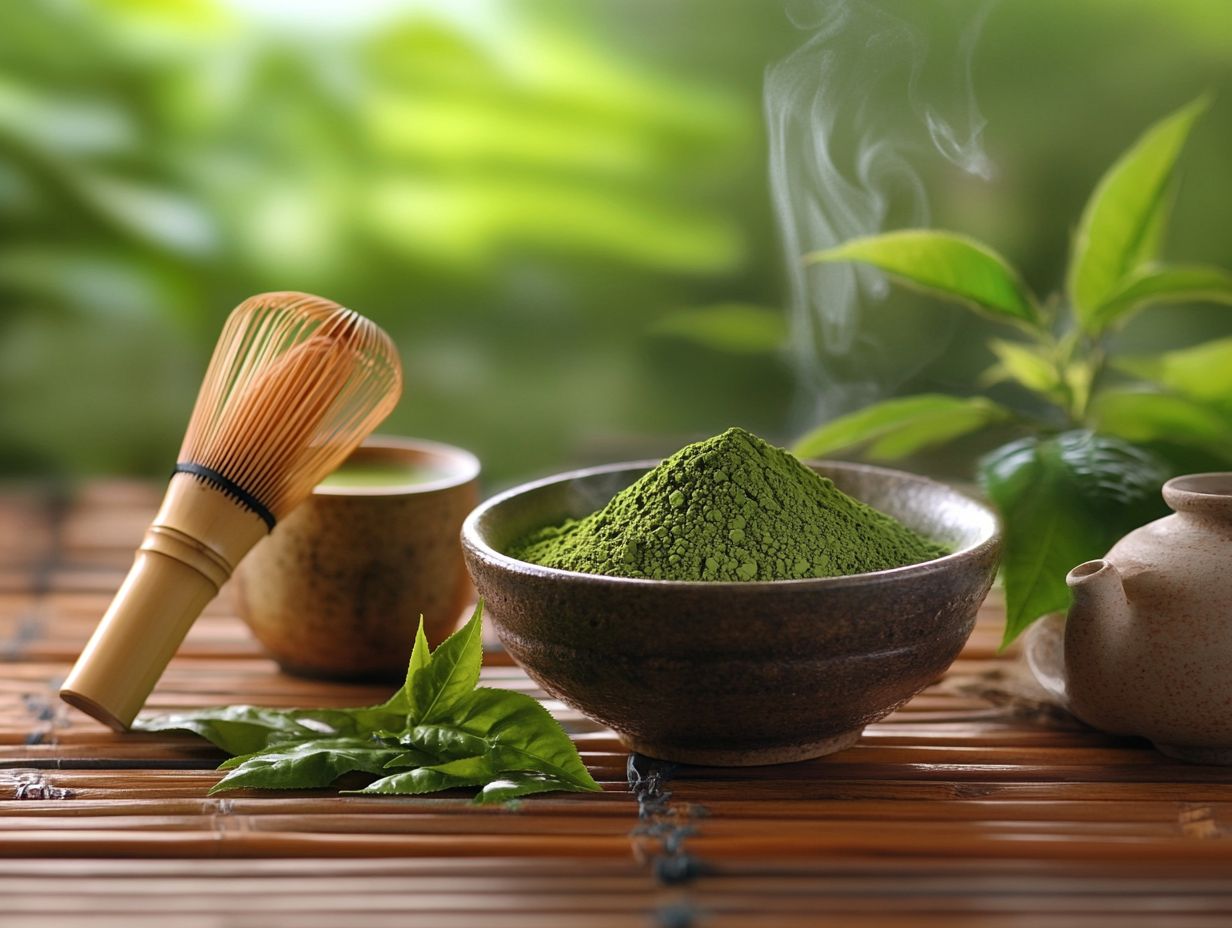
The health benefits of matcha are abundant and well-documented, largely due to its impressive antioxidant profile.
This bright green tea supports brain function, enhances metabolism, promotes the health of your liver and heart, and helps reduce inflammation and facilitate weight loss.
Boosting Energy and Metabolism
People love matcha for its amazing energy boost. Thanks to its caffeine content and antioxidant properties, you can enjoy increased energy without the jittery aftermath often experienced with coffee.
Unlike traditional coffee, which delivers a quick energy spike followed by a crash, matcha provides a more steady release of energy. This is due to its unique blend of caffeine and L-theanine, a relaxing ingredient found in matcha.
The natural compounds in matcha support fat oxidation and overall metabolic health, making it an ideal choice for anyone looking to maintain energy levels while effectively managing weight.
Supporting Brain Function and Mood
Rich in amino acids, particularly L-theanine, matcha supports your brain performance and aids in mood stabilization by lowering cortisol levels. It s no wonder it has become a favored choice for enhancing both focus and relaxation.
In contrast to coffee, which often leads to jittery feelings and spikes in anxiety, matcha offers a smoother, more sustained energy boost.
Research indicates that L-theanine encourages the production of alpha waves in the brain, fostering a meditative state that enhances clarity and bolsters mental resilience.
By integrating matcha into your daily routine, you could significantly elevate not only your brain performance but also your overall emotional well-being.
Improving Heart Health and Immunity
Matcha is a remarkable ally for your heart health. It can lower cholesterol levels, reduce inflammation, and boost your immune system with its impressive antioxidant content.
This bright green tea contains catechins, especially epigallocatechin gallate (EGCG), which are vital for promoting cardiovascular well-being.
By enhancing blood flow and preventing the oxidation of LDL cholesterol, matcha plays a significant role in maintaining healthy arteries and lowering the risk of heart disease.
Its anti-inflammatory properties target chronic inflammation, a key factor in various cardiovascular issues. The immune-boosting benefits of matcha support healthy cell function and increase metabolic activity.
Incorporating this superfood into your routine offers a holistic approach to enhancing your overall well-being and vitality.
How to Incorporate Matcha into Your Diet
Incorporating matcha into your diet can be a delightful and advantageous experience. With a plethora of exquisite recipes at your fingertips ranging from luxurious matcha lattes and refreshing smoothies to indulgent baked goods like matcha cookies and creamy ice cream you’ll find that matcha is a remarkably versatile ingredient in your culinary repertoire.
Try adding matcha to your day and feel the difference!
Recipes and Ideas
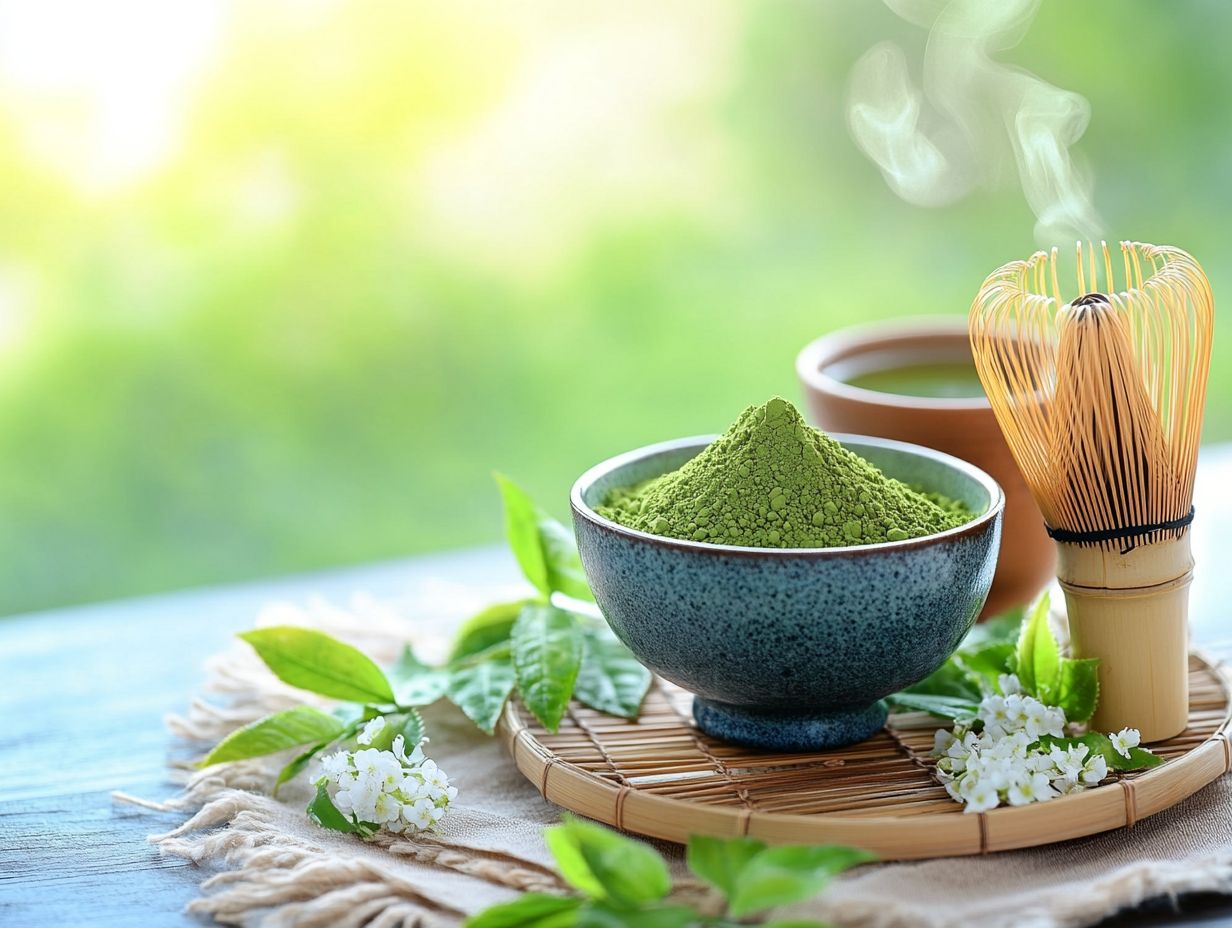
Countless delicious matcha recipes await your exploration! From refreshing matcha smoothies and creamy matcha lattes to tempting treats like matcha cookies and ice cream, these options offer incredible flavor along with health benefits.
If you re feeling adventurous in the kitchen, why not whip up a matcha green tea cake? Or try your hand at matcha-infused pancakes for a breakfast twist that s anything but ordinary! You ll typically start with high-quality matcha powder, milk or a dairy alternative, flour, and your favorite sweetener.
Unleash your creativity! For instance, mixing matcha with coconut milk can yield an exotic smoothie that s both creamy and delightfully nostalgic. Don t overlook the magic of adding matcha to your oatmeal or mixing it into yogurt for a surprising yet delightful breakfast boost!
Potential Risks and Precautions
While matcha presents an array of health benefits, it s crucial to be mindful of potential risks and side effects. This is especially important if you re sensitive to caffeine or have pre-existing conditions like high blood pressure, as excessive consumption could lead to health concerns.
Possible Side Effects and Interactions
Possible side effects of matcha may include insomnia, digestive issues, or an increased heart rate, particularly due to its caffeine content. If you have specific health conditions, it’s wise to consult a healthcare provider before incorporating it into your diet.
If you have anxiety disorders or heart conditions, consuming matcha without proper medical guidance could worsen your symptoms. While the high levels of antioxidants in matcha are generally beneficial, they can also interact with certain medications, such as blood thinners or diabetes drugs, potentially leading to unexpected complications.
Therefore, it is essential to assess your overall health status and discuss any potential risks with a healthcare professional, ensuring a safe and enjoyable experience with matcha.
Frequently Asked Questions
What are the benefits of matcha?
Matcha is rich in antioxidants and vitamins. It boosts brain function, promotes heart health, enhances metabolism, and can lower the risk of chronic diseases.
What makes matcha a superfood?
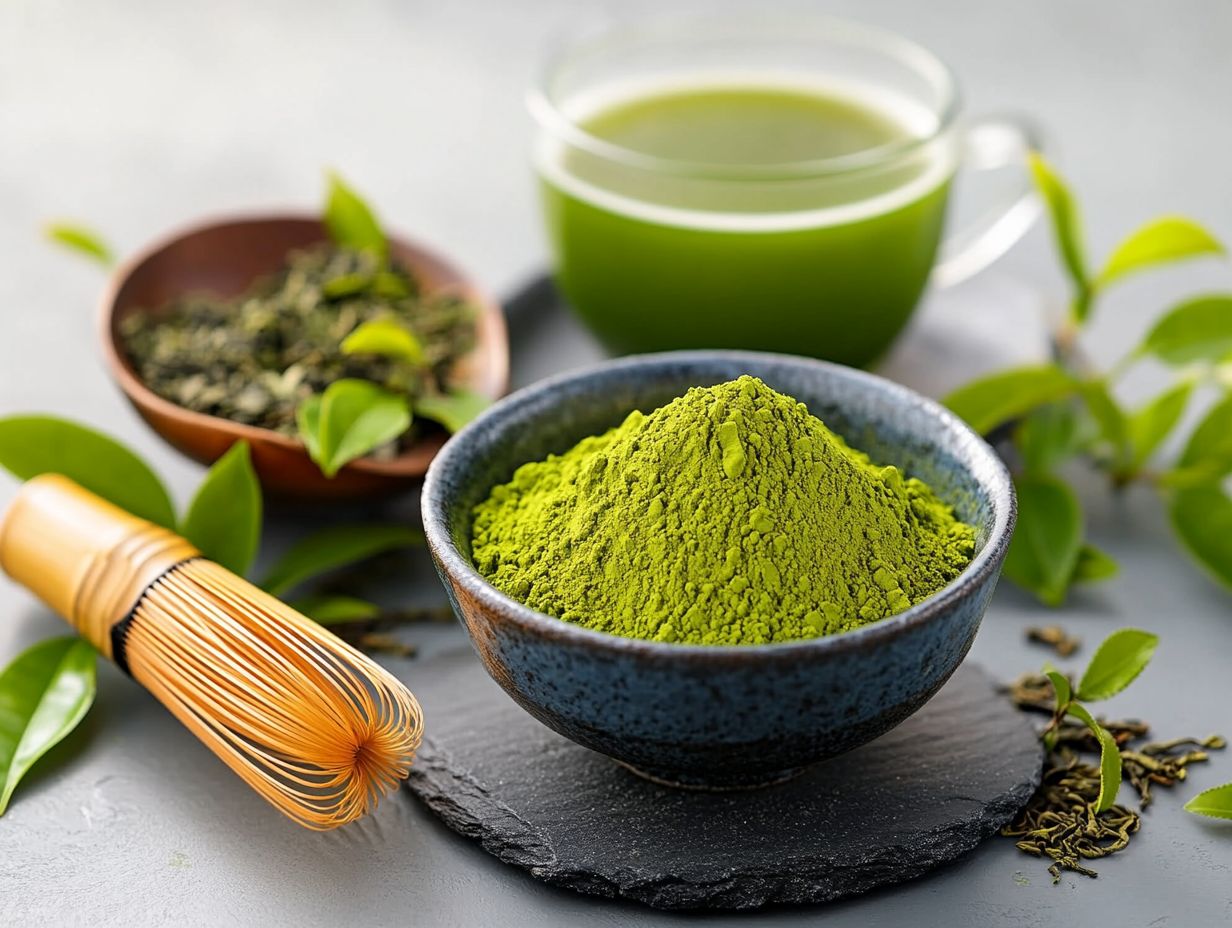
Matcha is considered a superfood due to its high antioxidant content and its ability to provide numerous health benefits. It contains over 137 times more antioxidants than regular green tea, making it a powerful superfood.
How is matcha different from regular green tea?
Matcha is made from finely ground green tea leaves, while regular green tea is made by steeping whole tea leaves. This difference in preparation results in a higher concentration of nutrients in matcha.
Can matcha help with weight loss?
Yes, matcha can aid in weight loss as it has been shown to boost metabolism and promote fat burning. Its high antioxidant content can also help reduce inflammation, which is linked to obesity.
Is matcha safe for everyone to consume?
Matcha is generally safe for most people to consume, but it is always recommended to consult with a healthcare professional before adding it to your diet, especially if you have any underlying health conditions or are pregnant or breastfeeding.
How can I incorporate matcha into my diet?
There are many ways to incorporate matcha into your diet, such as making matcha lattes, adding it to smoothies or baked goods, or simply enjoying it as a hot or iced tea. Just make sure to choose high-quality matcha to reap the most benefits.
Ready to dive into the world of matcha? Start your journey today!


